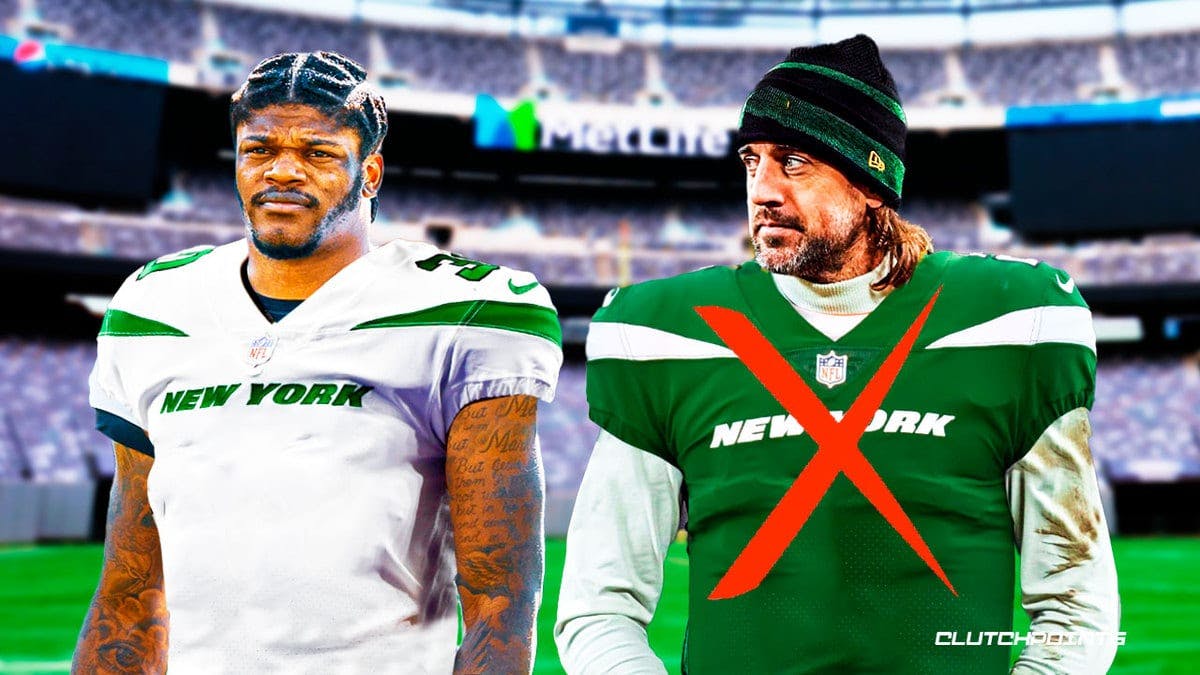The Aaron Rodgers trade is officially in the books, and the future Hall of Famer will be the quarterback for the New York Jets next season. The Jets got their man, and the organization and its fans are happy about it. However, after seeing what the team gave up to get the 18-year NFL veteran, it’s hard not to think the Jets should have made a Lamar Jackson trade instead.
The Jets should have made a Lamar Jackson trade instead of an Aaron Rodgers trade
The Jets have been desperate for a franchise quarterback really since Joe Namath — who led the team to its one and only Super Bowl win – left the team in 1976.
Since then, the Jets have tried drafting (Zach Wilson, Sam Darnold, Mark Sanchez, Chad Pennington, Ken O’Brien), signing (Ryan Fitzpatrick, Vinny Testaverde), and trading for (Brett Favre, Boomer Esiason) a franchise quarterback with no luck.
With the Aaron Rodgers trade, the Jets are getting a 10-time Pro Bowler, four-time All-Pro, and four-time NFL MVP as well as a Super Bowl champ. However, they are getting him at 39, and he’ll be 40 somewhere around Week 13 next season.
Only five NFL QBs have started 10 or more games in seasons where they were 40 years old or older. That’s Warren Moon, Vinny Testaverde, Brett Favre, Drew Brees, and Tom Brady. And only Brady, the greatest of all time, won a Super Bowl.
While Rodgers fits in with a lot of that group, the point is, the odds of him leading his team to a Super Bowl are stacked against him at his age.
Also, after the Aaron Rodgers trade, reports are that the Jets are in the process of redoing his massive contract. However, no amount of creative accounting can change the fact that the team will likely have to pay him over $100 million in the end.
Looking at what the Jets gave up to get Rodgers, the price was pretty steep. Forget the 2023 first-round pick swap and the fifth and sixth-round exchange. The Jets basically gave up a second this year and a second next year that will almost certainly become a first if Rodgers plays just 65% of the team’s snaps.
There is no protection for a Rodgers’ retirement or late-season injury in this deal. The trade could be a first and a second for one season of the QB in New York. That’s a disaster if Rodgers retires.
Lastly, and this is more esoteric than the other reasons, having Rodgers in front of the hot glare of the New York media seems like a disaster waiting to happen. The polarizing passer has stirred up an incredible amount of controversy in the last two seasons just by appearing once a week on the Pat McAfee Show. He’s also openly bristled at having to deal with national NFL insiders like Adam Schefter and Diana Russini.
In the Big Apple (or at least New Jersey), Rodgers is going to have media in his face more (and more aggressively) than he ever has in his career. If that’s not a recipe for disaster, I don’t know what is.
Lamar Jackson is just 26 years old and already has an MVP trophy on his mantle. Even if the Jackson injury concerns bear out, the Jets would have the QB for five to seven years longer than Rodgers at a minimum.
A Lamar Jackson trade would also come with a big new contract in the range of $50-plus-million per season. Yes, the Jets would have to pay that for longer than with Rodgers, but that’s the going rate for a star QB these days, and they’d have Jackson for much longer.
As for picks, if the Jets signed Jackson to a non-exclusive franchise tag offer sheet that the Ravens didn’t match, they could get Jackson for two firsts instead of a second and a first for Rodgers. That’s a steal at twice the price!
And if it were twice the price, meaning a straight-up Lamar Jackson trade where the team gives up four first-round picks and some other things, it would still be worth it to get one of the 10 best signal-callers in the NFL into the building.
The Jets haven’t had a franchise QB since Joe Namath partly because they’ve never had the No. 1 pick in a year with a transcendent quarterback available and partly because they always do this. They sign or trade for over-the-hill players or players with significant flaws or red flags.
In the 2023 NFL offseason, the Jets had two paths in front of them. One was bold and a little risky, but at the end was a QB the likes of which the franchise has never had. The other was the same path the organization has gone down time and time again in the last 40-plus years.
And unlike Robert Frost, the Jets chose the same path they always have with the Aaron Rodgers trade, and now chances are the results will be the same as well.




